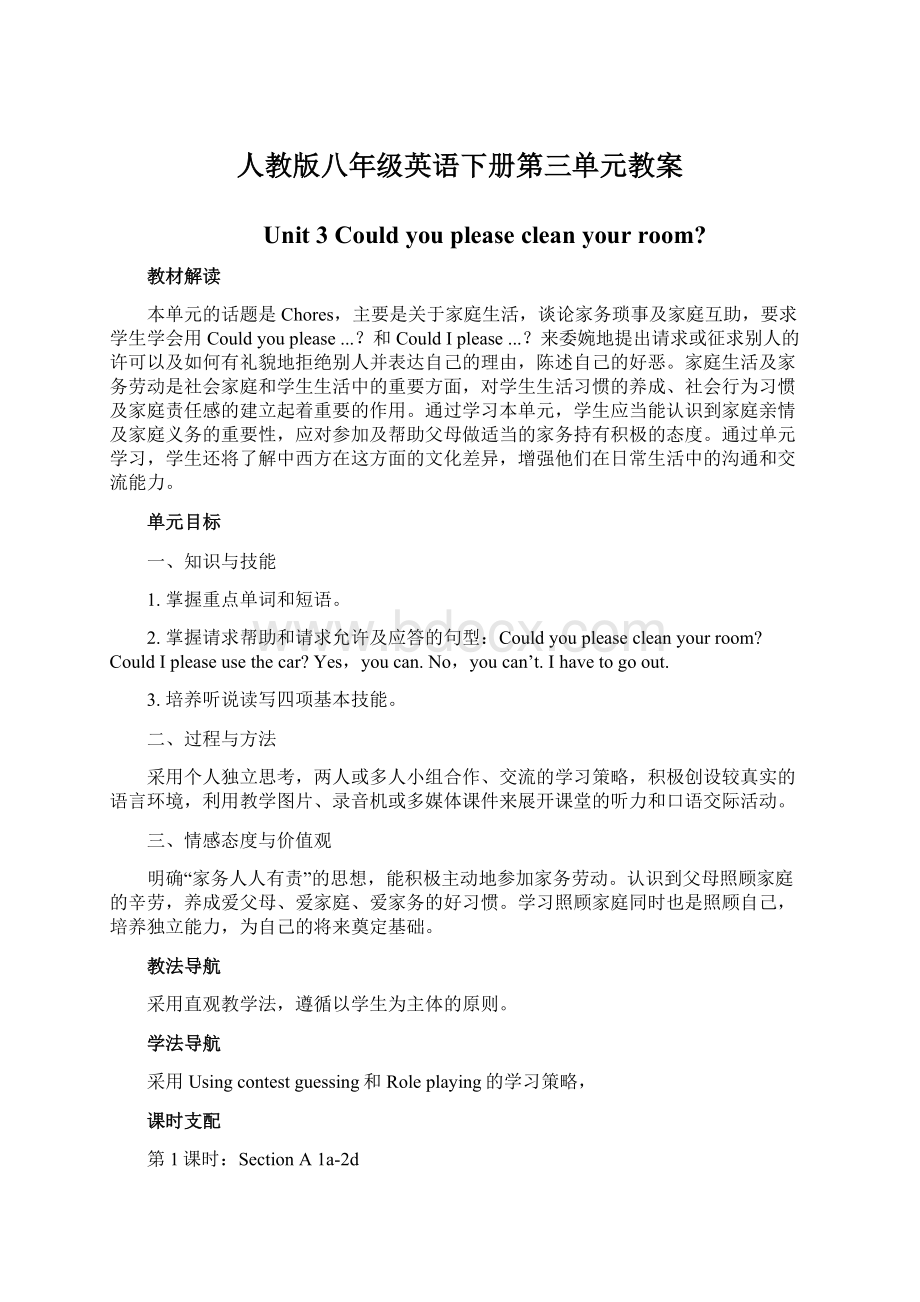人教版八年级英语下册第三单元教案.docx
《人教版八年级英语下册第三单元教案.docx》由会员分享,可在线阅读,更多相关《人教版八年级英语下册第三单元教案.docx(17页珍藏版)》请在冰豆网上搜索。

人教版八年级英语下册第三单元教案
Unit3Couldyoupleasecleanyourroom?
教材解读
本单元的话题是Chores,主要是关于家庭生活,谈论家务琐事及家庭互助,要求学生学会用Couldyouplease...?
和CouldIplease...?
来委婉地提出请求或征求别人的许可以及如何有礼貌地拒绝别人并表达自己的理由,陈述自己的好恶。
家庭生活及家务劳动是社会家庭和学生生活中的重要方面,对学生生活习惯的养成、社会行为习惯及家庭责任感的建立起着重要的作用。
通过学习本单元,学生应当能认识到家庭亲情及家庭义务的重要性,应对参加及帮助父母做适当的家务持有积极的态度。
通过单元学习,学生还将了解中西方在这方面的文化差异,增强他们在日常生活中的沟通和交流能力。
单元目标
一、知识与技能
1.掌握重点单词和短语。
2.掌握请求帮助和请求允许及应答的句型:
Couldyoupleasecleanyourroom?
CouldIpleaseusethecar?
Yes,youcan.No,youcan’t.Ihavetogoout.
3.培养听说读写四项基本技能。
二、过程与方法
采用个人独立思考,两人或多人小组合作、交流的学习策略,积极创设较真实的语言环境,利用教学图片、录音机或多媒体课件来展开课堂的听力和口语交际活动。
三、情感态度与价值观
明确“家务人人有责”的思想,能积极主动地参加家务劳动。
认识到父母照顾家庭的辛劳,养成爱父母、爱家庭、爱家务的好习惯。
学习照顾家庭同时也是照顾自己,培养独立能力,为自己的将来奠定基础。
教法导航
采用直观教学法,遵循以学生为主体的原则。
学法导航
采用Usingcontestguessing和Roleplaying的学习策略,
课时支配
第1课时:
SectionA1a-2d
第2课时:
SectionA3a-4c
第3课时:
SectionB1a-2e
第4课时:
SectionB3a-SelfCheck
课时教案
第1课时SectionA1a-2c
教学目标
一、知识与技能
1.掌握重点词汇和短语:
dothedishes,takeouttherubbish,foldyourclothes,sweepthefloor,makeyourbed,cleanthelivingroom
2.理解并掌握重点句型:
Couldyouplease…?
CouldI…?
3.能听懂有关做家务和日常活动的对话。
二、过程与方法
采用情境教学法,调动学生的积极性,引导他们积极参与课堂。
三、情感态度与价值观
了解各种家务,能发现要做的家务并积极主动地去做。
教学重点
能用本课的重点词汇和句型对家务作出委婉请求。
教学难点
能抓住录音中的关键词。
教法导航
课上引导学生积极参与课堂活动,老师少讲,鼓励学生多练。
学法导航
加强小组合作学习,积极回答问题。
教学准备
图片,录音机,多媒体。
教学过程
Step1Greetings
Greetthestudentsasusual.
Step2Lead-in
T:
Goodmorning,boysandgirls!
Iamalwaysverybusyonweekends.Somydaughteroftenhelpsmewiththehousework.Doyouoftenhelpyourmotherdothechoresathome?
(Write“chores”onblackboardandexplainit.)Here“chore”meanshousework.Couldyoupleasetellmewhatchoresyoudoathome?
S1:
Ioftencleanmyroom.
S2:
Iwashmyclothesandfoldmyclothes.
S3:
Icleanthewindow.
S4:
Imakemybedandsweepthefloor.
S5:
Icleanthelivingroom.
T:
Well,youaregoodboysandgirls!
Weshouldtrytobehelpfulanddosomechoresathome.
Step3Newwordsandexpressions
AskthestudentstolookatthepictureonPage17.
T:
Lookatthepictureonpage17.Whatcanyousee?
S1:
Peterandhismother.
S2:
Thedustbinisfull.
S3:
Thefloorisdirty.
S4:
...
T:
Sotherearealotofchorestodo,right?
Helpstudentstolearnthefollowingphrasesaboutchores:
cleanthelivingroom;dothedishes;sweepthefloor;makethebed;takeoutthetrash;foldtheclothes
Step4Presentation
T:
Ifyouwanttoasksomebodytodochores,howcanyouaskinEnglish?
S1:
Canyoudothechores?
S2:
Couldyoupleasedothechores?
T:
Whichonedoyouthinkisbetter?
students:
Thesecondone.
T:
Yes.Weshouldsay“Couldyoupleasedothechores?
”insteadofotherwaysbecauseitsoundsverypolite.Write“Couldyouplease...?
”ontheblackboard.
Step5Pairwork
T:
Inthepicture,themomasksthesontodosomechores.Whatdoesshesay?
S:
Peter,couldyoupleasetakeoutthetrash?
T:
Good!
Today,we’lllearnhowtomakepoliterequestswithcould.Itisveryimportanttobepoliteinourlife.Nowworkinpairs.Imagineyouarethemomandthesoninthepicture.Askyourpartnertodothechoresthatyousee.
Firstasktwostudentstoreadthesampleconversationinactivity1c.Thenstudentsmaketheirownconversations.Callseveralpairstodemonstratetheirconversationstotheclass.
Step6Listening
T:
YouwillhereaconversationbetweenPeterandhismother.WhatkindofchoresdoMomandPeterdo?
CheckMomorPeter.
Playtherecordingtwice.ForthefirsttimestudentsfocusonthechoresMomdoes;thesecondtime,focusonthechoresPeterdoes.Thenchecktheanswers.
Step7Alittlegame
Findoutthebesthelperathome.
T:
Doyouoftenhelpyourparentsdothechores?
Nowlet’schoosethebesthelperathome.Firstpleasewritedownallthechoresfromyourmemoryonapieceofpaper.Thencheckeachchoreyoudoathome.Theonewhocheckthemostchoreswillbethebesthelperathome.
Step8Groupwork
T:
Imaginewearegoingtocleanourclassroomthisafternoon.Youneedsomeonetohelpyoudosomethings.Thinkofthethingsyouneedtodoandmakepoliterequeststoyourpartners.Youmayfindthesephrasesuseful.
Showthefollowingphrasesonthescreen:
carrysomewater,cleanthedesks,cleanthechairs,cleanthewindows,cleantheblackboard,turnoffthelights,takedowntheoldpictures,putupthenewpictures,sweepthefloor.Afterafewminutes,callseveralgroupstoshowtheirconversations.
Step9Presentation
T:
Ican’tfindmypen.ButIhavetowritesomethingnow.WhatcanIdo?
S:
Youcanborrowapenfromothers.
T:
ButwhatshouldIsay?
S:
CanIuseyourpen?
T:
Butthatdoesn’tsoundverypolite.Anyotheridea?
S:
CouldIpleaseuseyourpen?
(Writethesentenceontheblackboard)
T:
Good!
That’saverypoliteway.
Step10Listening
AskthestudentstolookatthepictureonPage18.Thensay:
Lookatthepicture.That’sPeterandhisfather.Peteraskshisfatherifhecandofourthings.Lookatthechartinactivity2a.Whatarethefourthings?
Askastudenttoreadthethingsaloud.
T:
Whatdoeshisfathersay?
Nowpleaselistentothetapeandcheck‘yes’or‘no’inthechart.Playthetapetwice.Forthefirsttime,theyonlylisten.Thesecondtime,theycheck“yes”or“no”.Thenchecktheanswerswiththewholeclass.
T:
WhyPeter’sfathersayno?
Whatarehisreasons?
Let’slistentotheconversationagain.Drawlinestothereasonsinthechart.Beforeplaythetape,askastudenttoreadthereasonsgiven.Thenplaythetape.Ifnecessary,playitagain.Checktheanswers.
Helpstudentstosummarizedifferentwaysofansweringthequestion“CouldI...?
”Yes,youcan/Iguessso/Oh,yeah/Sure.No,youcan’t..../Sorry,but...
Step11Pairwork
T:
Nowlookatactivity2c.Workinpairs.StudentAisPeterwhoasksifhecandothings.StudentBisPeter’sfatherwhosays“yes”or“no”.Ifyousay“no”,giveareason.
Firstgettwostudentstoreadthesampleconversation.Thenstudentsmaketheirownconversations.
Step12Groupwork
T:
Imaginewe’llhaveaself-studyclassthisafternoon.Youwouldliketodomanydifferentthings.Howwillyouaskyourteacherforpermission?
Pleasedoitingroupsoffour.Onewillbetheteacher,andtheotherswillbethestudents,makeconversationlikethis:
S:
CouldIpleaselistentomusic?
T:
Noyoucan’t.
S:
CouldIpleasegotoplaybasketball?
T:
Sorry,youhavetostayinclass.
S:
CouldIpleasedrawpictures?
T:
Yes,youcan.
Afterthat,getseveralgroupstodemonstratetheirconversationstotheclass.
Step13Homework
1.Supposeyouarehavingaparty,andyouneedmoredrinksandsnacks.Butyoucan’tleavethehouse.Askyourclassmatesforhelp.Writeadialoguebetweenyouandyourclassmatewith“CouldIplease...?
”and“Couldyouplease...?
”
2.Understand,readandroleplaytheconversationin2d.
课堂作业
1.---Couldyoupleasesthefloor?
---Yes,sure.
2.---Couldyoupleasedothed?
---Sorry,Ican’t.Ihavetodomyhomework.
3.我每天早上都整理床铺。
I________the________everymorning.
4.我父母让我晚上不要在外面呆得太晚。
Myparentsaskedmenotto________________lateatnight.
5.CouldIwatchthefootballmatch?
(作肯定回答)
________,you________.
参考答案:
1.sweep2.dishes3.make,bed4.stayout5.Yes,can.
教学反思
多媒体能使整个教学过程表现为声、图、文并茂,使声音、图像、文字的呈现更自然。
为此,在课堂上,教师应该为学生创造学习氛围,让学生时常有成功感和成就感,以便进一步激发学生学习的内在动力。
在本堂课中应注意让发音较标准的同学多朗读,让思维敏捷的同学先回答问题,让善于观察的同学多纠正错误,让反应慢的同学多回答低难度问题。
尽量使每个同学多动脑、多动口、多动手。
第2课时SectionA3a-4c
教学目标
一、知识与技能
1.复习、巩固表示委婉请求和应答的句型。
2.培养阅读理解能力。
3.完成相关练习。
二、过程与方法
将抽象知识具体化,帮助学生总结规律,系统地学习语法。
调动学生的积极性,引导他们积极参与课堂。
三、情感态度与价值观
认识到做家务的意义和重要性,养成常做家务的好习惯。
教学重点
复习、巩固表示委婉请求和应答的句型。
教学难点
培养阅读理解能力。
教法导航
通过大量练习让学生主动掌握语法知识。
学法导航
练习、讨论、主动探求规律。
教学准备
多媒体。
教学过程
Step1Greetings
Greetthestudentsasusual.
Step2AGame
Showalistofchoresontheblackboard:
dothedishescleanyourroom
takeoutthetrashsweepthefloor
foldyourclothesmakeyourbed
Givethemasetofblankcards.
T:
Let’splayagame.Youwillworkingroupsoffour.Firsteachgroupwritesthechoresonthecards.Putthemfacedown.Thefirststudentturnsoveracard,andasksthestudentnexttohim/hertodothischore.Thatstudentsays“no”andgivesareason.Eachstudentshouldgiveareasonthathasnotbeengivenbefore.Theonewhocan’tgiveaproperreasonwillbeoutofthegame.Thosewhocankeepcomingupwithreasonswillbethewinner.
Step3Roleplay
Asksomepairstoroleplaythedialoguein2d.
Step4Presentation
Say:
Asweallknow,Motherdoesalmostallthehouseworkinthehouse.Sheisalwaystired.ShouldwehelpMother?
Whatwecandotohelpher?
Asksomestudentstoreporttheiranswers.
Step5Reading
Say:
Nowlet’sreadanarticleaboutNancyandhermother.Pleasereadquicklyandanswerthequestions:
1.WhywasNancy’smomangrywithher?
2.Didtheysolvetheproblem?
How?
Thenasksomestudentstoreporttheiranswers.
Nowlet’sreadthesentencesin3b,trytounderstandandtranslatethem.Thenreadthepassageagaincarefullyandtrytounderlinethesentencesfromthereadingthatmeanthesamething.Afterseveralminutes,asksomestudentstoreporttheiranswersandtranslatethesentencesintoChinese.
Step6Languagepoints
1.YouwatchTVallthetimeand...
allthetime(在该段时间内)一直;向来,一向;时时刻刻;每时每刻
e.g.Idothisallthetime.我一直是这么做的。
Thishappensallthetime.这种情况是时时发生的。
2.I’mjustastiredasyouare!
as...as意为“和…一样”,表示同级的比较。
使用时要注意第一个as为副词,第二个as为连词。
其基本结构为:
as+ adj./ adv. +as。
e.g.This film is as interesting as that one.这部电影和那部电影一样有趣。
Your pen writes as smoothly as mine.你的钢笔书写起来和我的一样流畅。
注意:
as…as的否定形式为“notas/so+adj./adv.+as”。
e.g.Hedidn’tactaswellasyou.他表现得不如你好。
3.Foroneweek,shedidnotdoanyhousework,andneitherdidI.
1)neither用作副词,作“也不”解释,放在句首,表示前面否定的内容也适用于另一个人或物,句子须采用部分倒装。
此时也可用nor替换neither使用